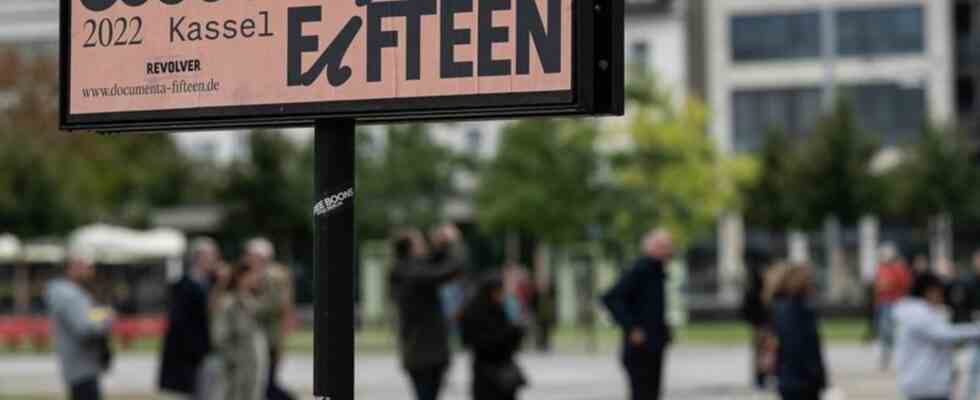This Sunday, documenta fifteen ends in Kassel after 100 days. However, the dominant theme was the allegations of anti-Semitism. What does this mean for the future of the world art show?
Scandals are not the exception at documenta, they are the rule. But none of the 14 previous world art exhibitions in Kassel polarized as much as documenta fifteen. The ever-new allegations of anti-Semitism against the show have overshadowed everything else. This Sunday the exhibition ends after 100 days. However, the debate about the documenta as an institution is far from over.
“The results of the documenta are sobering,” is the conclusion drawn by Hesse’s art minister, Angela Dorn (Greens). Works were shown that should not have been shown, said the deputy chairman of the supervisory board of documenta gGmbH at the request of the German Press Agency.
Dorn again emphasized that the responsibility for the exhibited works lay exclusively with the curators. Unfortunately, the Indonesian artists’ collective Ruangrupa did not assume this responsibility, “but acted according to the principle of distributed irresponsibility and allowed supporters of the Israel boycott movement BDS to instrumentalize the documenta for their agenda”.
Months of debate
The scandal at the documenta was preceded by a month-long anti-Semitism debate about the show. At the beginning of the year, the first voices were raised accusing Ruangrupa and some invited artists of being close to the anti-Israel boycott movement BDS. Shortly after the opening of documenta fifteen in June, in which Federal President Frank-Walter Steinmeier took part only after some hesitation in view of the allegations, a banner with anti-Jewish motifs by the Indonesian artist collective Taring Padi was discovered and taken down.
In the weeks that followed, more works appeared, triggering sharp criticism and calls for the works to be reviewed and for the show to be stopped. The shareholders appointed a panel of experts to deal with the scandal.
A red line has been crossed for Ruangrupa, Ruangrupa member Farid Rakun recently told the Berlin art magazine Monopol. When the Advisory Board was set up, the curators got the impression that the body was “ultimately an extended arm of politics”. “It’s traumatic for many of us, including us from Indonesia. When the state does something to expand its power through others, in this case scientists, it’s very worrying.”
Structures of the exhibition should be checked
With a view to the events of the past few weeks, Angela Dorn now said: “The structures of the documenta were overwhelmed.” According to the decision of the shareholders, the city of Kassel and the state of Hesse, they would therefore be subjected to a review with the help of the expert panel. “Because we need a thorough, honest analysis, and we need consequences,” says Dorn. “It is our task as partners of the documenta to set it up in such a way that it retains its unique position as a globally important exhibition for contemporary art in Kassel in the future.”
The deputy chairwoman of the CDU/CSU parliamentary group, Dorothee Bär, says she does not believe in restarting the documenta on her own. The nature of the crisis management suggests this conclusion. Bär speaks of a “cocktail of confused structures, a collective of curators that doesn’t want to stop igniting, a management level that is close to the BDS movement, and a political environment that couldn’t or didn’t want to intervene.”
She explained: “With or without investigating the anti-Semitism incidents: documenta fifteen will go down in history as a disaster.” Just last week, the CSU politician had demanded the immediate closure of the exhibition and the reclaim of the 3.5 million euros that had flowed to the exhibition through the Federal Cultural Foundation as a donor.
The art exhibition threatens to fail
Bär stressed that the parliamentary group would continue to insist on the repayment of the federal funds. In addition, “a fundamental structural reform” must be tackled “with all determination”. “If there are signs at the next documenta in five years that this cocktail could be repeated, then there simply won’t be a cent left, at least not from the public purse. Then the world art exhibition in Germany has failed.”
And what remains of the art at documenta fifteen? “In view of the anti-Semitism debate that accompanied it, this documenta did not find it easy to place its actual artistic concerns,” said the interim managing director of the show, Alexander Farenholtz. “I wish that the exhibition in the retrospective could also be perceived as what it was in the perception of many visitors: namely an artistic undertaking that addresses the most pressing questions of our time.”
The artists themselves felt they were being treated unfairly, said the Cuban artist Tania Bruguera, who is represented at the documenta with the Instar collective. The removal of the Taring Padi banner was correct, she explained to the “Monopoly”. However, it felt as if all participants had been drawn into a discussion that was not theirs.
“Suddenly we all had to fear that we would be labeled as anti-Semitic because we were in this exhibition,” Bruguera said. One has to consider that other countries in the world have a different history with Israel than Germany. As a state, Israel has done things that can also be criticized.

